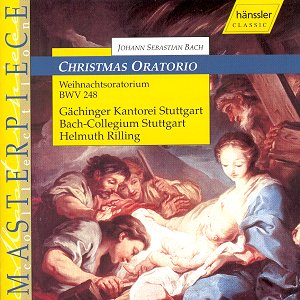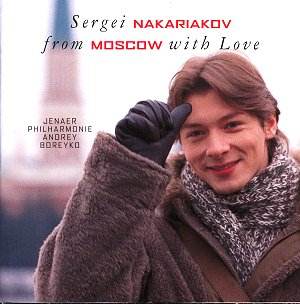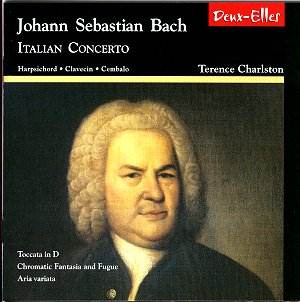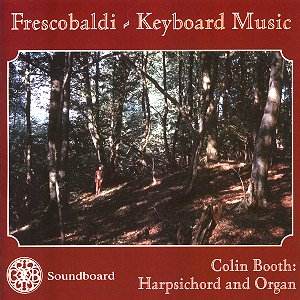 Composer: Johann Sebastian Bach
Composer: Johann Sebastian Bach
Works: Christmas Oratorio, BWV 248
Performers: Arleen Auger (soprano), Julia Hamari (contralto), Peter Schreier (tenor), Wolfgang Schöne (bass), Gächinger Kantorei Stuttgart, Bach-Collegium Stuttgart/Helmuth Rilling
Recording: Recorded April/July 1984, Gedächtniskirche, Stuttgart
Label: Hänssler Classic
The Christmas Oratorio, composed by Johann Sebastian Bach in 1734, stands as a tour de force within the choral repertoire, merging theological narrative with the exuberance of celebration. This work is not merely a musical setting of the Christmas story; it is an intricate tapestry of faith, human emotion, and dramatic expression. Helmuth Rilling’s recording, dating back to 1984, benefits from his profound experience with Bach’s oeuvre, yet it raises questions regarding interpretative choices that reflect broader trends in Bach performance.
Rilling’s interpretation is marked by clarity and vitality, hallmarks of his longstanding association with the Gächinger Kantorei. The orchestral textures are light and articulate, and the ensemble’s precision is commendable, particularly in the crisp articulation of the trumpets. However, the emphasis on a meticulous, note-by-note execution may inadvertently strip the music of its inherent lyricism and emotional depth. For example, in the opening chorus of Part V, while the rhythmic foundation is taut and invigorating, the individual notes often feel overly delineated, lacking the flowing sense of phrase that allows Bach’s lines to breathe. This approach, prevalent among many conductors of Rilling’s generation, risks distancing the listener from the expressive heart of the music.
The recording itself shines in terms of engineering, with a spacious sound that captures the acoustics of the Gedächtniskirche beautifully. Each voice and instrument occupies its own distinct space, enhancing the overall listening experience. The balance between the choir and soloists is well-managed, allowing the listeners to appreciate the intricate interplay of voices and instruments. Yet, while the technical clarity is admirable, one might argue that it sometimes comes at the cost of a unified interpretative vision. This can be felt acutely in the chorales, which are rendered with a rigid adherence to the score, eschewing the legato phrasing that could better convey the music’s emotional weight.
Among the soloists, Peter Schreier’s contributions are particularly noteworthy. His tenor voice shines with a free and easy emission, effortlessly navigating the demanding tessitura of his arias. His interpretation of “Ach, mein herzliebes Jesulein” demonstrates both technical prowess and a sensitivity to the text, bringing forth an expressive shape that resonates deeply. In contrast, Wolfgang Schöne’s bass, while possessing a rich tone, occasionally suffers from an overly staccato approach that detracts from the lyrical intent of the recitatives. Arleen Auger and Julia Hamari, both accomplished vocalists, provide a robust presence; however, Auger’s moments of staccato in “Nur ein Wink von seinen Händen” seem misaligned with the musical markings, raising questions about Rilling’s tempo choices.
Rilling’s experience is undeniable, yet it appears to have led him towards a performance style that prioritizes precision over emotional nuance. While the recording is a testament to the technical capabilities of the performers, one cannot help but feel that the deeper spiritual and emotional layers of Bach’s music could have been more vividly realized. A more romantic interpretation, reminiscent of the performances by conductors such as Mengelberg or Furtwängler, might have infused the work with a warmth and humanity that is somewhat lacking here.
This recording offers a clean, clear, and energetically executed rendition of the Christmas Oratorio, featuring a formidable cast of soloists and an expertly managed ensemble. However, the interpretative choices often prioritize clarity over emotional depth, leaving the listener to ponder whether this approach truly captures the essence of Bach’s sublime music. Rilling’s longstanding dedication to Bach is evident, yet it raises the question of whether a greater engagement with the music’s emotional core might yield an even more rewarding experience. As it stands, this recording is an impressive achievement, though it may not fully satisfy those seeking a more deeply felt interpretation of Bach’s timeless masterpiece.



